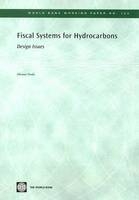
Fiscal Systems for Hydrocarbons
Design Issues
Seiten
2007
World Bank Publications (Verlag)
978-0-8213-7266-1 (ISBN)
World Bank Publications (Verlag)
978-0-8213-7266-1 (ISBN)
- Titel z.Zt. nicht lieferbar
- Versandkostenfrei innerhalb Deutschlands
- Auch auf Rechnung
- Verfügbarkeit in der Filiale vor Ort prüfen
- Artikel merken
Examines the key elements of the legal and fiscal frameworks utilized in the petroleum sector and aims to outline desirable features that should be considered in the design of fiscal policy with the objective of optimizing the host government's benefits, taking into account the effect this would have on the private sector's investment.
Although host governments and investors may share one common objective - the desire for projects to generate high levels off revenue - their other goals are not entirely aligned. Host governments aim to maximize rent for their country over time, while achieving other development and socioeconomic objectives. Investors aim to ensure that the return on investment is consistent with the risk associated with the project, and with their corporations' strategic objectives. To reconcile these often conflicting objectives, more and more countries rely on transparent institutional arrangements and flexible, neutral fiscal regimes. This paper examines the key elements of the legal and fiscal frameworks utilized in the petroleum sector and aims to outline desirable features that should be considered in the design of fiscal policy with the objective of optimizing the host government's benefits, taking into account the effect this would have on the private sector's investment.
Although host governments and investors may share one common objective - the desire for projects to generate high levels off revenue - their other goals are not entirely aligned. Host governments aim to maximize rent for their country over time, while achieving other development and socioeconomic objectives. Investors aim to ensure that the return on investment is consistent with the risk associated with the project, and with their corporations' strategic objectives. To reconcile these often conflicting objectives, more and more countries rely on transparent institutional arrangements and flexible, neutral fiscal regimes. This paper examines the key elements of the legal and fiscal frameworks utilized in the petroleum sector and aims to outline desirable features that should be considered in the design of fiscal policy with the objective of optimizing the host government's benefits, taking into account the effect this would have on the private sector's investment.
| Erscheint lt. Verlag | 23.8.2007 |
|---|---|
| Zusatzinfo | Illustrations |
| Verlagsort | Washington |
| Sprache | englisch |
| Maße | 178 x 254 mm |
| Themenwelt | Sozialwissenschaften ► Politik / Verwaltung |
| Technik ► Elektrotechnik / Energietechnik | |
| Wirtschaft ► Betriebswirtschaft / Management ► Finanzierung | |
| ISBN-10 | 0-8213-7266-1 / 0821372661 |
| ISBN-13 | 978-0-8213-7266-1 / 9780821372661 |
| Zustand | Neuware |
| Informationen gemäß Produktsicherheitsverordnung (GPSR) | |
| Haben Sie eine Frage zum Produkt? |
Mehr entdecken
aus dem Bereich
aus dem Bereich
Allgemeines Steuerrecht, Abgabenordnung, Umsatzsteuer
Buch (2024)
Springer Gabler (Verlag)
28,00 €
Band 1: Grundlagen der Besteuerung, Ertragsteuern
Buch | Softcover (2024)
Vahlen (Verlag)
29,80 €
Investition, Finanzierung, Finanzmärkte und Steuerung
Buch | Softcover (2022)
Vahlen (Verlag)
39,80 €


